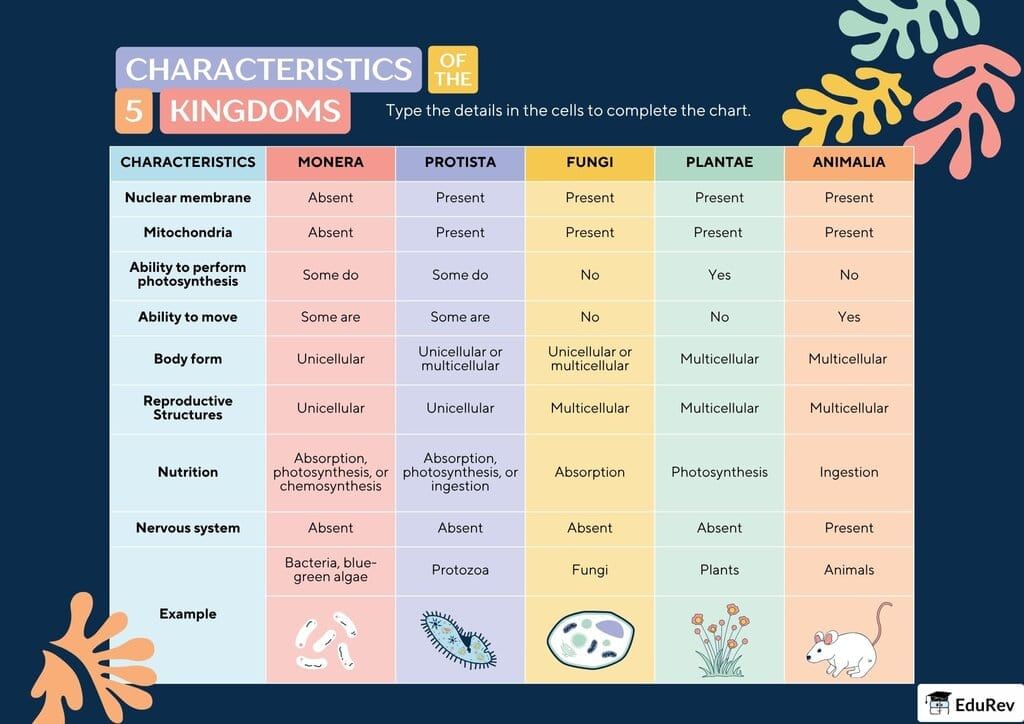NEET Exam > NEET Notes > Biology Class 11 > Poster: Five Kingdom Classification
Poster: Five Kingdom Classification | Biology Class 11 - NEET PDF Download

The document Poster: Five Kingdom Classification | Biology Class 11 - NEET is a part of the NEET Course Biology Class 11.
All you need of NEET at this link: NEET
|
169 videos|531 docs|136 tests
|
FAQs on Poster: Five Kingdom Classification - Biology Class 11 - NEET
| 1. What are the main characteristics of the five kingdoms in the Five Kingdom Classification? |  |
Ans. The Five Kingdom Classification divides all living organisms into five distinct kingdoms: Monera, Protista, Fungi, Plantae, and Animalia. Monera includes prokaryotic organisms like bacteria, characterized by their lack of a true nucleus. Protista consists of unicellular and simple multicellular organisms, often with a nucleus, such as algae and protozoa. Fungi are primarily decomposers, with cell walls made of chitin, and play a crucial role in nutrient cycling. Plantae includes multicellular organisms that perform photosynthesis, characterized by cell walls made of cellulose. Animalia consists of multicellular, heterotrophic organisms that lack cell walls and are usually motile at some stage of their life cycle.
| 2. Who proposed the Five Kingdom Classification and when? |  |
Ans. The Five Kingdom Classification was proposed by Robert Whittaker in 1969. His classification was revolutionary as it introduced a more organized way of categorizing organisms based on their cellular organization, nutrition, and reproduction methods, moving beyond the previous two or three kingdom systems.
| 3. How does the Five Kingdom Classification differ from the Three Domain System? |  |
Ans. The Five Kingdom Classification categorizes life into five groups based on characteristics like cell structure and nutritional modes, while the Three Domain System classifies life into Archaea, Bacteria, and Eukarya based on genetic and biochemical differences. The Three Domain System is more modern and highlights the evolutionary relationships among organisms, emphasizing the distinction between prokaryotic and eukaryotic life forms.
| 4. Why is the Five Kingdom Classification important for biological studies? |  |
Ans. The Five Kingdom Classification is essential for biological studies as it provides a structured framework for understanding the diversity of life. It helps in identifying organisms, studying their interactions, and understanding ecological roles. This classification also aids in research related to evolution, environmental science, and biotechnology by offering insights into the relationships among different groups of organisms.
| 5. What are the limitations of the Five Kingdom Classification? |  |
Ans. The limitations of the Five Kingdom Classification include its inability to address the complexities of microbial life and the genetic relationships among organisms. For instance, some organisms that belong to different kingdoms may share significant genetic similarities. Additionally, the classification does not account for horizontal gene transfer, especially in prokaryotes, which complicates the evolutionary relationships among organisms. As research advances, new classifications may be proposed to better reflect these complexities.
Related Searches
















